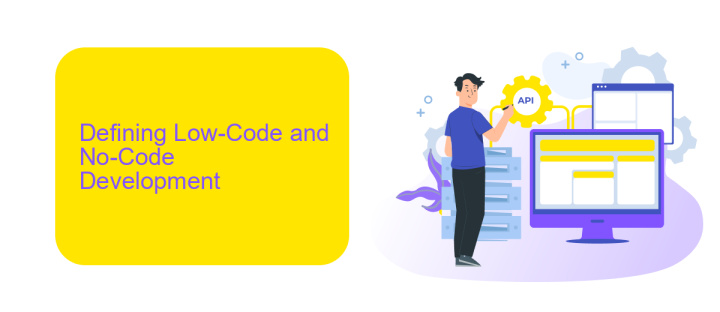Low-Code No-Code App Development
Low-Code No-Code (LCNC) app development is revolutionizing the way businesses build software by enabling users with little to no coding experience to create powerful applications. This approach significantly reduces development time and costs, democratizing app creation and fostering innovation. In this article, we explore the benefits, challenges, and future prospects of LCNC platforms in the rapidly evolving tech landscape.
Introduction
Low-code and no-code app development platforms are revolutionizing the way businesses and individuals create software. These platforms enable users with minimal or no coding experience to build applications quickly and efficiently, democratizing the app development process.
- Reduced development time and costs
- Increased accessibility for non-developers
- Enhanced collaboration between technical and non-technical teams
One of the critical advantages of low-code and no-code platforms is their ability to integrate with various services seamlessly. Tools like ApiX-Drive make it easy to connect different applications and automate workflows, further simplifying the development process. By leveraging these platforms, organizations can swiftly adapt to changing market demands and drive innovation without the need for extensive coding expertise.
Defining Low-Code and No-Code Development

Low-code and no-code development are approaches that enable the creation of applications with minimal hand-coding or no coding at all. Low-code platforms provide a visual interface where developers can drag and drop components to build applications, while still allowing for custom code when necessary. No-code platforms, on the other hand, cater to users with little to no programming knowledge by offering pre-built templates and a fully visual development environment. Both approaches aim to accelerate the development process, reduce costs, and make app development more accessible to a broader audience.
These platforms often come with built-in tools for integrating various services and APIs, which simplifies the process of connecting different systems. For instance, ApiX-Drive is a service that helps set up integrations between various applications without requiring any coding skills. By using such tools, businesses can automate workflows, synchronize data across platforms, and enhance overall operational efficiency. This democratization of app development empowers not only professional developers but also business analysts and other non-technical users to create functional applications tailored to their specific needs.
Benefits and Potential

Low-Code No-Code app development offers numerous benefits and holds significant potential for businesses of all sizes. By reducing the need for extensive coding knowledge, these platforms empower non-technical users to create and manage applications efficiently.
- Speed: Rapid development cycles allow for quicker deployment of applications.
- Cost-Effectiveness: Reduces the need for hiring specialized developers, lowering overall costs.
- Flexibility: Enables easy modifications and updates to applications without extensive rework.
- Integration: Tools like ApiX-Drive facilitate seamless integration with existing systems and services, enhancing functionality.
- Accessibility: Democratizes app development, making it accessible to a broader range of users within the organization.
The potential of Low-Code No-Code platforms extends beyond just ease of use. They enable businesses to innovate faster, respond to market changes more swiftly, and maintain a competitive edge. With services like ApiX-Drive, integrating various applications and automating workflows becomes straightforward, further amplifying the benefits of Low-Code No-Code development.
Challenges and Considerations

Low-code and no-code app development platforms offer numerous advantages, but they also come with their own set of challenges and considerations. One of the primary concerns is the potential for limited customization. While these platforms provide a wide range of functionalities, they may not always meet the specific needs of every business, leading to constraints in app capabilities.
Another significant challenge is integration with existing systems. Many businesses rely on a variety of software tools and platforms, making seamless integration crucial for operational efficiency. Low-code and no-code platforms may struggle to connect with all the necessary services, creating potential bottlenecks.
- Limited customization options
- Integration challenges with existing systems
- Potential security vulnerabilities
- Dependence on platform providers
To address integration issues, services like ApiX-Drive can be invaluable. ApiX-Drive facilitates the connection between various applications and systems, ensuring smooth data flow and operational consistency. However, businesses must carefully evaluate their specific needs and the capabilities of their chosen platform to ensure successful implementation.


Future Outlook
The future of Low-Code No-Code app development looks incredibly promising, driven by the increasing need for rapid digital transformation and the democratization of software creation. As businesses seek faster, more efficient ways to develop applications, these platforms will continue to evolve, offering more advanced features and greater customization options. This trend will empower not only professional developers but also non-technical users to create sophisticated applications, fostering innovation and reducing time-to-market for new solutions.
Integration capabilities will play a crucial role in the future landscape of Low-Code No-Code development. Tools like ApiX-Drive will become essential, enabling seamless connections between disparate systems and enhancing the functionality of applications. By simplifying the integration process, these services will allow users to effortlessly combine various APIs and data sources, further expanding the potential of Low-Code No-Code platforms. As a result, we can expect a surge in the adoption of these technologies across different industries, paving the way for a more connected and efficient digital ecosystem.
FAQ
What is Low-Code No-Code app development?
Who can benefit from Low-Code No-Code platforms?
What types of applications can be built using Low-Code No-Code platforms?
How do Low-Code No-Code platforms handle integrations with other systems?
Are Low-Code No-Code platforms secure and scalable?
Apix-Drive is a universal tool that will quickly streamline any workflow, freeing you from routine and possible financial losses. Try ApiX-Drive in action and see how useful it is for you personally. In the meantime, when you are setting up connections between systems, think about where you are investing your free time, because now you will have much more of it.

